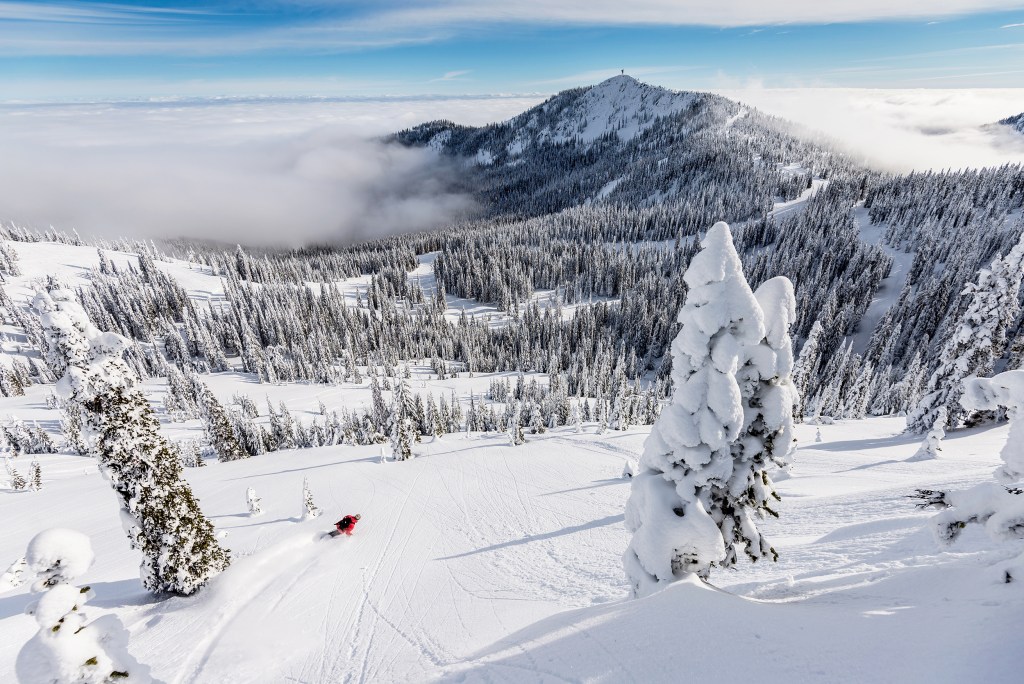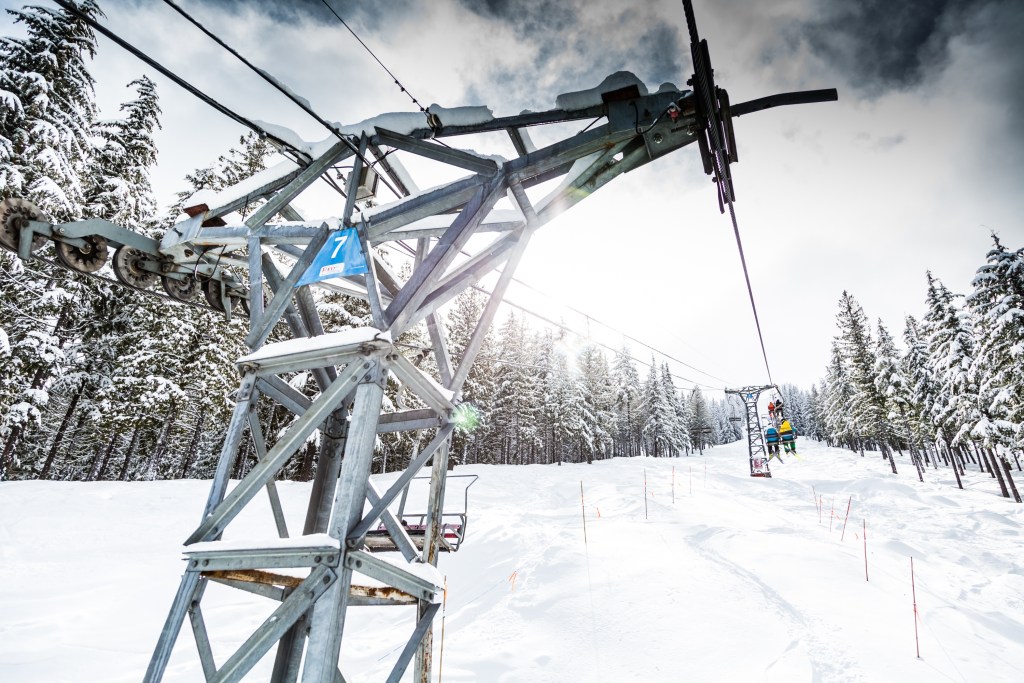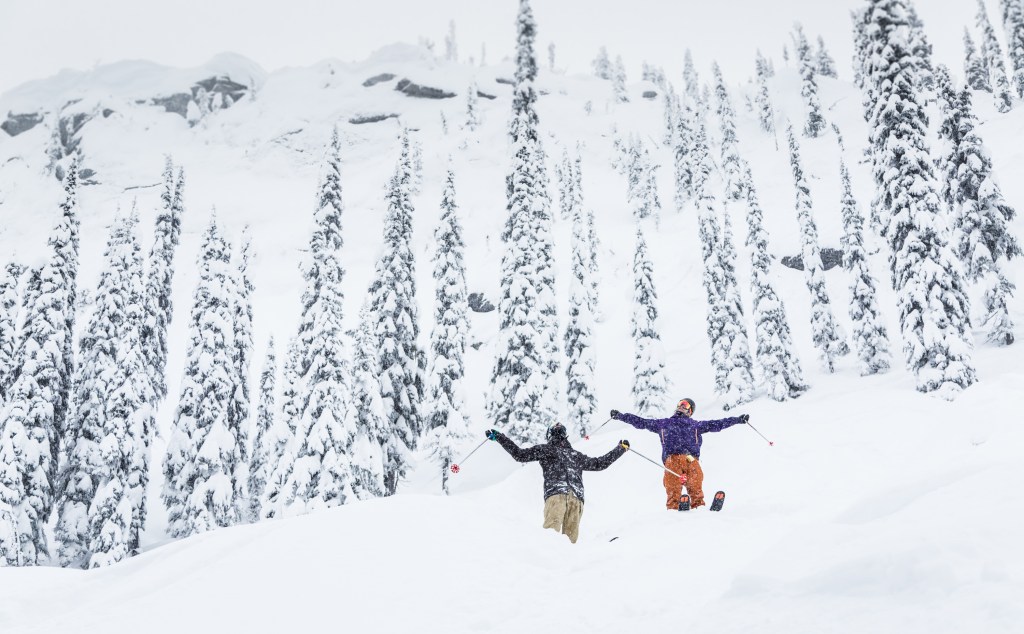Red Mountain, British Columbia, raises $1.8 million through crowdfunding campaign.
Reno Debasio pushes off the Granite chairlift at Red Mountain, in Rossland, British Columbia, sparking hellos from fellow skiers. At 82 years old and having spent over six decades at Red, Debasio, a longtime volunteer ski patroller, is somewhat of a local celebrity.
He and I spend the morning cruising around the mountain and catching up with friends while he gives me a history lesson about Red and the town of Rossland, which sits just downhill from the base. Debasio’s life has been intertwined with this mountain since its humble ski-club beginnings. “It still feels like a community-run ski hill,” he says.
In fact, that’s exactly what it’s trying to become. In August 2016, the ski area’s CEO Howard Katkov launched a first of its kind public ownership campaign called “Fight The Man. Own The Mountain,” a crowdfunding effort to turn the ski area from privately owned into a full-fledged co-op.
Open initially only to Canadians, the online campaign on its first day set the largest single-day amount for an equity crowdfunding project in Canada. It drew in over $508,000 CAD, according to the crowdfunding site FrontFundr. This past November, the site opened up the fundraising to Americans, and by December 1, 2017, they’d exceeded their $1.5 million funding goal, raising roughly $1.8 million in total.

Photo Credit: Seth Holton/Red Mountain
Red Mountain, the third-oldest ski area in North America, saw its first skiers in the late 1800s, Scandinavians who traveled to Rossland during the Gold Rush. The Red Mountain Ski Club formed the backbone of the town’s rich skiing history. Since 2004, when Katkov bought the mountain from a group of private investors, Red’s been slowly modernizing and expanding.
Now with 4,200 skiable acres, the ski area has strategically-placed lifts that opened up new zones such as Granite, Grey and Kirkup, where a snowcat ride to even more inbounds terrain costs $10 CAD. There have also been renovations to on-mountain lodges and a new four-star hotel, The Josie, is set to open at the base this winter.
“I grew up in Mammoth when it was four bucks a day to ski. That’s the culture I was used to and what I still like today,” says Katkov. “It’s just an amazing community that has authenticity, soul and friendliness, which is getting few and far between with resort consolidation … I’m just the caretaker of this endangered species.”

Photo Credit: Ryan Flett/Red Mountain
Red’s crowdfunding campaign launched just two weeks after Vail Resorts acquired Whistler Blackcomb in August 2016, just one in a string of major resort consolidations, including the emergence of Aspen Skiing-KSL Capital Partners, which now owns Squaw Valley, Aspen’s four mountains, Mammoth and more. According to the National Ski Areas Association, 44 ski resorts across North America are now in the hands of four corporations. The upside of those mergers is that season-pass prices have dropped (see, for example, Stowe and Whistler’s current pass prices under Vail’s ownership) and more joint passes now offer access to multiple mountains.
At Red, Katkov knew skiers already had a relationship with the mountain and might be open to creating a different future for Red. Plus, Katkov was fascinated by the traction crowdfunding sites were giving brands, so when he learned from a friend how private companies can get equity from non-accredited investors, he set out to establish the campaign.
“We became a touch point for people who remember the ski areas where they spent their youth,” Katkov says. “These places are disappearing not just as ski resorts, but as places where people grew up.”
Katkov wants Red to be a place everyone can afford to visit. He hopes to keep ticket prices the same (a day ticket costs $75 CAD if you buy in advance, which is relatively affordable compared to equally sized resorts) and not raise rates on lodging and food. A modern-day hostel is opening this winter next to the new hotel that will provide rooms for $40 a night. “We don’t want to disenfranchise young people for kick-ass skiing,” he says. “If you want 25 restaurants and spas everywhere, then don’t invest here.”

Photo Credit: Ryan Flett/Red Mountain
The fundraising capital from donations gives people a sense of ownership in the mountain, and even though they’re not voting members, they’ll become part of the extended family of Red Mountain.
Tiered ownership perks for investors include things like season passes, lift tickets and artist-designed skis. The money they raise—the fundraising will remain open until April 2018—will support on-hill capital improvements like the renovation of the go-to lunch spot on the mountain, Paradise Lodge.
“This has taken on a life of its own,” Katkov says about the campaign. “People want to be a part of something, protecting something they love that doesn’t exist anymore.”
